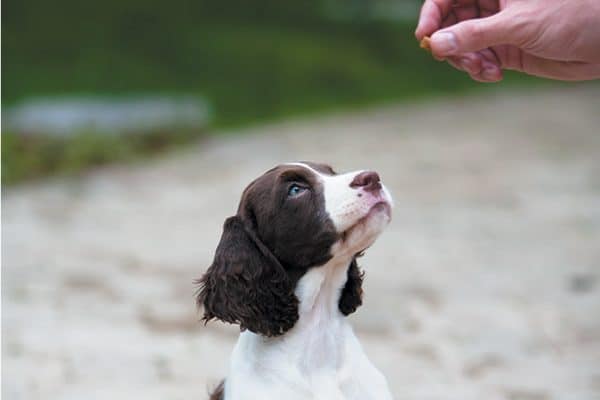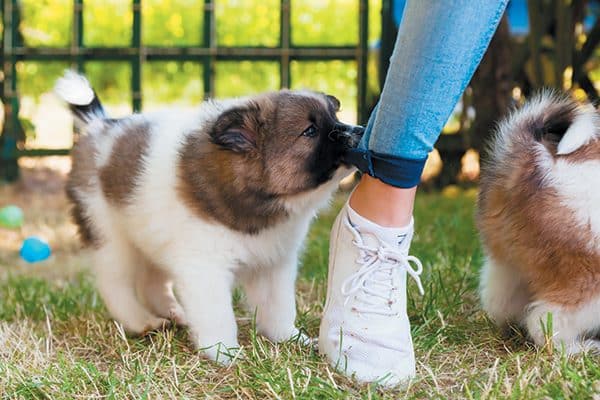The post Will Your Puppy Outgrow These Bad Behaviors? by Jill Breitner appeared first on Dogster. Copying over entire articles infringes on copyright laws. You may not be aware of it, but all of these articles were assigned, contracted and paid for, so they aren’t considered public domain. However, we appreciate that you like the article and would love it if you continued sharing just the first paragraph of an article, then linking out to the rest of the piece on Dogster.com.
Most people think puppy behaviors are so darn cute — chewing on shoes and hands, jumping up on us and guests — that they don’t think to teach them how to behave appropriately early on. In reality, this lack of teaching appropriate ways of being is unintentionally reinforcing these puppy behavior problems and why they grow into them, not out of them. The only reason for puppies to become destructive chewers, be out of control, jump on people or playfully bite us is because we don’t start teaching appropriate behaviors right away.
Train from Day One

Teach your pup that putting “four on the floor” will get him the rewards and attention he wants. Photography ©hnijjar007 | Getty Images.
Puppies are growing and able to learn at a very early age. In fact, training begins the minute we bring puppies into our lives at 8 weeks of age. The myth that training puppies shouldn’t start until they are 6 months old couldn’t be farther from the truth.
The myth gained traction because puppy classes didn’t begin until puppies were fully vaccinated, and this didn’t happen until they were 6 months of age, in the days of old. Thankfully, over the past decades, we have gleaned much about the importance of early puppy development, enrichment, socialization and training.
Today, thanks to studies by veterinary behaviorists and dog training experts, we now realize the importance of early training, beginning as soon as they are able to see and hear, at about 3 weeks of age.
They are learning from their littermates, mother, their environment and their caregivers how to be a dog, socialize with each other, other species and, of course, us. This early training continues from the moment we bring them home, through to maturity, between 1 ½ to 3 years of age.
What this means is that puppies are learning appropriate and inappropriate behaviors based on how we are raising/teaching them, in these early weeks. It’s up to us, as their guardians and advocates, to teach them the behaviors we want rather than correcting behaviors that we don’t want.
The right environment

It’s up to us as our puppy’s guardian and advocate to teach him the behavior we want rather than correcting the behavior we don’t want. Photography ©Mark Rogers.
Puppies explore their world through their noses and mouths. You can say that puppies see their world via their noses. Those noses are capable of smelling 100,000 times better than humans, and we need to allow for this by creating a safe and enriching smell-sensitive environment.
Often, what puppies smell goes directly into their mouths, and that’s why puppy-proofing your home before he arrives is crucial to properly raising a puppy. What many may perceive as bad behaviors are just normal puppy exploration behaviors that need to be redirected to behaviors that we do want instead of thinking that we need to punish them for normal, instinctive puppy behaviors.
Common puppy behaviors
- Playful biting: Puppies play with each other by biting and wrestling with their littermates, and when they leave their littermates this behavior doesn’t just go away. This is normal, natural and instinctive play, and when we wrestle with them, allowing them to bite even playfully, we are actually encouraging a behavior that will bite us in the butt, (pun intended) later on.
- Destructive chewing: Destructive chewing is not synonymous with raising puppies. Since puppies see their world through their noses and mouths, they will put anything and everything in their mouths. If we don’t properly supervise them and puppy-proof our homes, we are inadvertently reinforcing a normal behavior to become a destructive behavior.
- Jumping on people: Puppies jump all over their littermates, so for them it’s normal play behavior. A puppy flying through the air, leaping into our laps is laughed at and then snuggled, unintentionally reinforcing a behavior that we will later regret.
Tips to stop these unwanted behaviors

Puppies repeat behaviors that work for them. Photography ©chris-mueller | Getty Images.
- Playful biting: Provide an outlet for your puppy. Find other friendly dogs/puppies for them to play with the way they want and need to play. Redirecting them to a toy or game of fetch or tug-of-war will go a long way to keeping their mouths off of us.
- Destructive chewing: Supply them with appropriate chew toys, enrichment puzzles and games to help teach them what they can chew on and what they can’t. Being proactive in raising a puppy will go a long way to not having a destructive chewer as an adult.
- Jumping on people or furniture: They are being puppies wanting to play, and it’s up to us to teach them how we want them to interact with us. Teaching an alternate behavior like sit or not engaging them when they jump, only engaging when they have all four feet on the floor is reward enough to repeat a behavior that gains our attention. Puppies repeat behaviors that work for them. If we don’t engage them while they are jumping but remain quiet and not give eye contact until they have all fours on the ground, they will quickly learn that keeping their feet on the ground gets our attention.
Being proactive by meeting your puppy’s instinctive physical, mental and emotional needs will set a precedent for appropriate behaviors that will manifest into a healthy, well-adjusted adult dog.
Thumbnail: Photography ©Mark Rogers.
Editor’s note: This article appeared in Puppies, a special issue from Dogster magazine. Look for Puppies on a newsstand near you!
About the author:
Award-winning writer Jill Breitner has been training dogs since 1978. Her passion lies in teaching people about dog body language. Jill created the Dog Decoder app (available in Google Play and iTunes) as a way to enhance the human-dog bond by understanding them better. You’ll find her at play near the ocean. Follow her at dogdecoder.com, facebook.com/dogdecoder and on Twitter at @shewhispers.
Read more about puppies on Dogster.com
- Think You’re Ready for a Puppy? Your New Puppy Checklist
- Do You Have Scared Puppy? What to Look For — and How to Help Him
- Schedules and Guides for Feeding Puppies
The post Will Your Puppy Outgrow These Bad Behaviors? by Jill Breitner appeared first on Dogster. Copying over entire articles infringes on copyright laws. You may not be aware of it, but all of these articles were assigned, contracted and paid for, so they aren’t considered public domain. However, we appreciate that you like the article and would love it if you continued sharing just the first paragraph of an article, then linking out to the rest of the piece on Dogster.com.
No comments:
Post a Comment